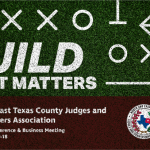July 15-18, Kyle Field - Brazos County
When it comes to this year’s conference theme, Build What Matters, the early bird session on July 15 could not be a better fit. Designed to provide an in-depth and concentrated learning experience on the budget, this four-hour training, free of charge, will include calendars, grant considerations, and adoption procedures. Registration for the budget workshop is separate from … [Read more...] about North & East Texas Annual Conference






